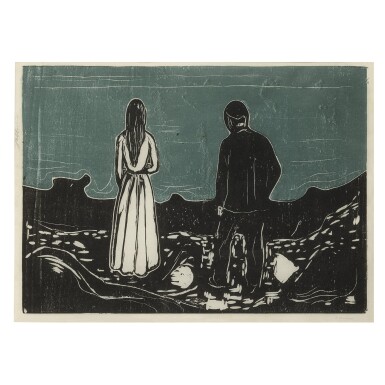Important Prints and Multiples Evening Sale
Important Prints and Multiples Evening Sale

Property from the Collection of Catherine Woodard & Nelson Blitz, Jr.
EDVARD MUNCH | TWO HUMAN BEINGS. THE LONELY ONES (SCHIEFLER 133; WOLL 157)
Auction Closed
October 25, 12:01 AM GMT
Estimate
700,000 - 900,000 USD
Lot Details
Description
Property from the Collection of Catherine Woodard & Nelson Blitz, Jr.
EDVARD MUNCH
1863 - 1944
TWO HUMAN BEINGS. THE LONELY ONES (SCHIEFLER 133; WOLL 157)
Woodcut printed in teal and black, 1899, Woll's I.1 of VIII, an early impression before the crack in the block above the woman's head, signed in pencil, on laid Japan paper, printed by Lassally, framed
image: 395 by 548 mm 15½ by 21⅝ in
sheet: 453 by 584 mm 17⅞ by 23 in
New York, National Academy of Design, Edvard Munch and Harald Sohlberg: Landscapes of the Mind, 1995-96
Greenwich, Connecticut, Bruce Museum, Love, Isolation and Darkness: The Art of Edvard Munch, 1996-97
Two figures stand on the Åsgårdstrand shore, looking very much together, yet alone. Their emotional void rivals the expanse of the vast blue waters ahead, with the long-haired woman oblivious to her partner’s implied gaze. In creating this mysterious scenario, Munch divided his woodblock into thirds, treating each piece individually. The ocean and the woman were worked separately, while the man is joined to the shore. Physically anchored to the foreground, he will never be able to reach his partner. Materially and symbolically, she is isolated from the other components of the composition, truly lost in her own world.
This early, clear impression of one of Munch’s most celebrated printed subjects is a rarity. The inventive draftsman, who continually reimagined and revised his prints, later added work to the rocky foreground. Through much repeated use over many years, the woodblocks began to wear, with a fine diagonal crack appearing over the man’s shoulders and a cut extending to the woman’s head. This preliminary impression best conveys the painter-printmaker’s original intent and enhances our understanding of his ever-evolving printmaking process.
